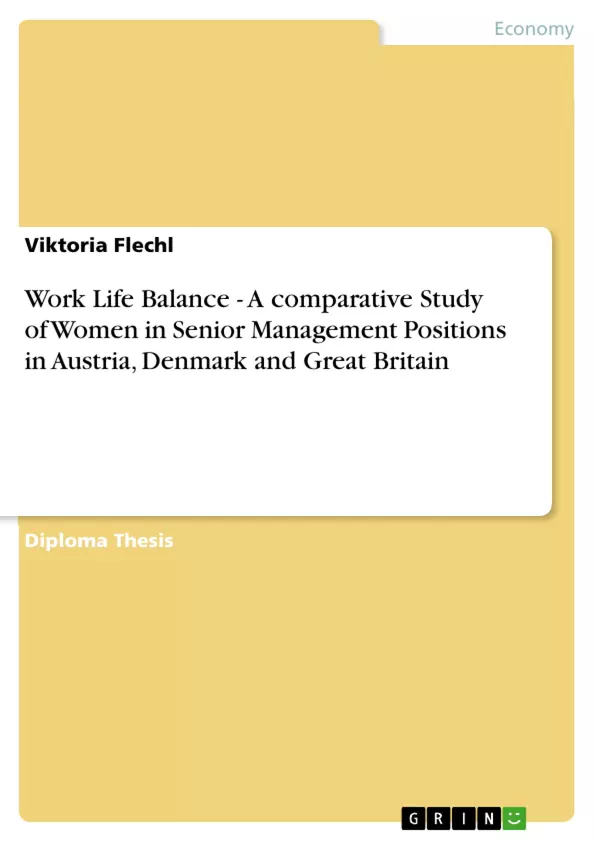The purpose of this research was to investigate how women in senior management positions combine a successful career and family life. The research was conducted in Austria, Denmark and the UK, and qualitative data was collected via a series of semi-structured interviews. Through this research different types of support, including women’s priorities and values, as well as their abilities have been discussed with the aim to find out how they manage their work-life balance. Additionally, interactions between professional and private life have been considered in order to explore if there is a connection between work-life balance and work performance.
The research findings indicated that there are some historical and cultural problems as well as individual circumstances which make it difficult to combine work and family life. Women manage their time effectively and organise everything, but managing multiple roles is a complex challenge, which requires sophisticated solutions. Women need support from their family; help from their partners and companies’ flexibility are identified as the most important things to reach a satisfactory work-life balance. Additionally, childcare has to be provided by the government or organised privately so that women can focus on their careers.
This study concluded that women have to invest considerable personal resources, such as time and energy in order to achieve a satisfactory work-life balance through their career life cycle. In addition, evidence suggested that a satisfied work-life balance has a positive impact on work performance. Further research recommendations have been given as well as a pragmatic self-generated model.
Inhaltsverzeichnis (Table of Contents)
- 1. Introduction
- 1.1. Justification
- 1.2. Objectives
- 1.3. Outline
- 2. Literature Review
- 2.1. Background
- Women's Roles since the 1950s
- Family Models
- Division of Household
- 2.2. Individuals
- Work-Life Conflict
- Career Life Cycle
- Critical Resources
- 2.3. Organisations
- Work-Life Programmes
- Flexible Working
- 2.4. Social Policies
- Work-Life Policies
- Progression in Europe
- 2.5. Chapter Summary
- 3. Research Design
- 3.1. Research Methodology
- 3.2. Research Philosophy and Approach
- 3.3. Research Strategy
- 3.4. Research Process
- 3.5. Ethical Issues
- 3.6. Chapter Summary
Zielsetzung und Themenschwerpunkte (Objectives and Key Themes)
This research aims to investigate how women in senior management positions balance a successful career with family life. The study focuses on three countries: Austria, Denmark, and the UK. Qualitative data is collected through semi-structured interviews to explore the types of support, priorities, values, and abilities that women utilize to manage their work-life balance.
- Challenges and difficulties faced by women in combining work and family life
- The role of support from family, partners, and companies in achieving a satisfactory work-life balance
- The impact of work-life balance on work performance
- The importance of childcare and its availability in supporting women's careers
- The personal resources and effort required by women to achieve a balanced work-life throughout their career cycle
Zusammenfassung der Kapitel (Chapter Summaries)
The study begins with an introduction that justifies the research and outlines its objectives. Chapter 2 delves into the literature review, exploring the background of women's roles since the 1950s, family models, and the division of household labor. It further examines individual perspectives on work-life conflict, career life cycle, and critical resources. The chapter then analyzes organizational approaches to work-life balance, including programs and flexible working options. Finally, it explores social policies related to work-life balance and its progression in Europe. Chapter 3 discusses the research design, methodology, philosophy, strategy, process, and ethical considerations.
Schlüsselwörter (Keywords)
This study focuses on the intersection of work-life balance, women in senior management, cultural differences, support networks, career life cycle, childcare availability, and work performance.
Frequently Asked Questions
How do women in senior management positions balance career and family?
Successful balance requires effective time management, organizational skills, and significant personal resources like energy. Support from partners and flexible company policies are crucial factors.
Which countries were included in the comparative study?
The research conducted qualitative interviews with women in senior management in Austria, Denmark, and the United Kingdom.
Does work-life balance impact work performance?
Yes, the study suggests that a satisfactory work-life balance has a positive impact on overall work performance and professional efficiency.
What role does government policy play in supporting women's careers?
The availability of government-provided or privately organized childcare is essential for allowing women in management to focus on their career progression.
What are the main obstacles to a healthy work-life balance for these women?
Historical and cultural problems, such as traditional family models and the unequal division of household labor, continue to make combining work and family a complex challenge.
- Citation du texte
- Viktoria Flechl (Auteur), 2009, Work Life Balance - A comparative Study of Women in Senior Management Positions in Austria, Denmark and Great Britain, Munich, GRIN Verlag, https://www.grin.com/document/144433



